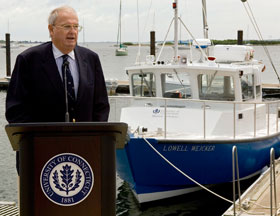  |
| HOME | THIS ISSUE | CALENDAR | GRANTS | BACK ISSUES | < BACK | NEXT > |
New research vessel named for former Governor - June 19, 2006
|
||||
|
Marine scientists at the University on Thursday opened a new era of coastal exploration and education with the commissioning of a new research vessel, the R/V Lowell Weicker.
The vessel is named in honor of former U.S. Senator and Connecticut Governor Lowell P. Weicker Jr. The 36-foot research vessel can be deployed quickly and easily in coastal waters, enabling scientists and educators to explore and observe the coastal environment of Long Island Sound, a research focus of the marine sciences department. UConn trustee and benefactor Richard Treibick, who suggested to the Board of Trustees the name for the vessel, has endowed the Marine Sciences Research and Outreach Fund to provide long-term support for the work of the University’s marine scientists and the R/V Lowell Weicker. Weicker is a long-time supporter of marine sciences research and education at the University. He worked to establish UConn as a national Sea Grant institution and as one of only six National Undersea Research Centers. The R/V Lowell Weicker was purchased with funding from the National Oceanic and Atmospheric Administration, and with support from UConn’s Research Foundation. “Thanks in great measure to Senator – then Governor – Weicker’s vision, UConn is a national leader in marine sciences and related fields,” said University President Philip E. Austin. “This isn’t just a vital area of scientific research; it’s something critical to the economy of our state. “Today’s ceremony gives us the opportunity to recognize Lowell Weicker’s contribution,” Austin added, “and gives us the chance to thank an outstanding trustee, Richard Treibick, for his ongoing support. It also underlines our partnership with the National Oceanic and Atmospheric Administration and the federal government.” Equipped with laboratory space and designed for small moorings, the vessel’s primary mission is to support the Long Island Sound Integrated Coastal Observing System (LISICOS) program, in which marine scientists monitor the coastal environment and model ways to manage it. NOAA has funded the coastal observing program at UConn since the early 1990s. LISICOS scientists monitor eight instrument-laden buoys deployed along the length of the coast and up the Thames River. Real-time data are relayed to the marine sciences department and are analyzed and reported at 15-minute intervals on www.mysound.uconn.edu. The instruments monitor variables such as wind speed, water currents and temperature, and the salinity and oxygen concentration of the water in eight areas of the Sound, including the coastal waters off Greenwich, New Haven, New London, Norwalk, and Hempstead Harbor, N.Y. Marine scientists in the coastal monitoring program are particularly interested in hypoxia – low oxygen conditions in the Sound that affect fish and marine resources. The research vessel will enable scientists to check and deliver instruments to the buoys more frequently, and to examine areas of the coast that would be difficult to reach from a large vessel. “Our work is directed toward understanding the factors that determine the health of the Long Island Sound ecosystem,” said Ann Bucklin, professor and head of the Department of Marine Sciences and director of UConn’s Marine Sciences and Technology Center. “What we learn can be used by many people – from commercial shippers to fishermen, recreational boaters, municipal planners, and others. We are working to ensure that our coast and the Sound remain beautiful and productive for future generations.” |
| ADVANCE HOME UCONN HOME |

